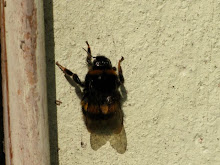 The good Septembr weather is continuing, and I am taking advantage of it to do one more inspection of the hive. It is also time for the second and final treatment with another Apiguard.
The good Septembr weather is continuing, and I am taking advantage of it to do one more inspection of the hive. It is also time for the second and final treatment with another Apiguard.Over the last 2 weeks I had a total varroa drop of 90. This gives an average varroa drop of about 6.4 per day, which is not bad I suppose. When I open the hive today the bees are calm and going about their business. On close inspection I found that the number has definitely grew. Leaving it alone for quite a number of weeks has helped. nearly all the frame, apart from three, are full of honey, and there are some signs of sealed brood cells, which means the queen is about and still laying.
In today's newspaper there is an item of the dreaded Asian honet. It would seems that the French is having a bad time of it. Needless to say we are thinking of when rather then if the little beasts will jump the Channel and get over here. I suppose we shall worry about that when it happens. 'Experts' reckon we have 10 years to get use to the idea. You can read about it here:
http://www.guardian.co.uk/world/2009/sep/25/predatory-hornet-sighting-paris-france
Last week I bought some honey from a local beekeeper whoes bees are a mere one mile away. The honey is good so I am hoping that it's an indication what mine will be like. Can't wait.


